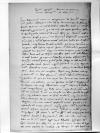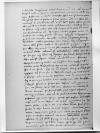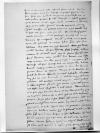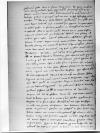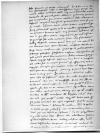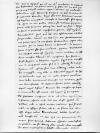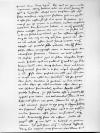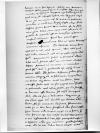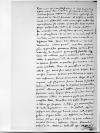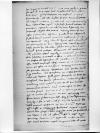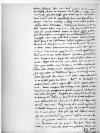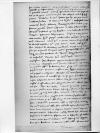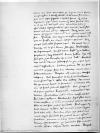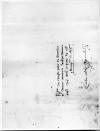Iam destinatus eram in ⌊Hungariam⌋ ad ⌊Ioannem regem⌋, cum orig. quum⌈cumcum orig. quum⌉ ⌊Gandavi⌋ redditae sunt mihi ⌊⌋ tuae de vicesima secunda Februarii. Proinde existimavi me ⌊⌋ commodissime respondere posse, cum orig. quum⌈cumcum orig. quum⌉ ⌊Viennam⌋ ⌊Austriae⌋ essem perventurus, quod et iter mihi per postas faciendum esset, et exinde cotidie orig. quottidie⌈cotidiecotidie orig. quottidie⌉ tabelliones ad manum essent, qui ⌊Cracoviam⌋ proficiscerentur. Accessit, quod animus circa longinquam profectionem occupatus et a multis in varias districtus partes haud sane habilis fuit ad officium scribendi neque deerat adversa valetudo, quae tamen excusare me non potuit apud caesares nostros ⌊Carolum⌋ et ⌊Ferdinandum⌋, quominus acceptarem eam provinciam magno cum dolore amicorum meorum, quibus caesare Karolo apud nos versante potuissem operam meam accommodare, ut taceam interim, quod magno cum dispendio rei privatae absentia mea a domo est superinscribed⌈estest superinscribed⌉ propter munera publica, quibus incumbo. Sed haec ita esse, ut sinam.
Cum orig. Quum⌈CumCum orig. Quum⌉ venissem ⌊Viennam⌋, inveni magnam solitudinem in aula ⌊reginalis maiestatis⌋. Factores, ut vocant, mercatorum aberant in nundinis Budensibus. Amici alius alio concesserat. Distuli itaque scribere ⌊Viennae⌋, quod existimarem me ⌊Budae⌋ assecuturum orig. assequuturum⌈assecuturumassecuturum orig. assequuturum⌉ meliorem occasionem, ob id maxime, quod haerendum orig. herendum⌈haerendumhaerendum orig. herendum⌉ ibi foret per dies aliquot, dum ⌊Ioannes rex⌋ certior de adventu meo redderetur, qui iam ferebatur transiisse in ⌊Transsylvaniam⌋. Ex ⌊Strigonio⌋ vero postquam redditus certior magnificus ⌊Stephanus a Raska⌋ comes Newgradiensis, qui ⌊Budae⌋ praeerat, respondit se nullum modum habere aut mandatum de me aut deducendo, aut deduci faciendo ad ⌊regem suum⌋ neque videretur cupere, ut ⌊Budam⌋ concederem, neque spem faceret ullam. Coactus sum
cf. Sen. Ben. 4.38.2 Non est turpe cum re mutare consilium ⌊ex re mutare consiliumcf. Sen. Ben. 4.38.2 Non est turpe cum re mutare consilium ⌋ et, ut ⌊principibus⌋ meis obsequerer, aliam inire rationem perficiendi itineris. Quae res me a rescribendo omnino avertit sollicitum anxiumque, quibus modis conceptam de me opinionem industriae aliquantae retinerem.
Commisi me tandem itineri venique ⌊Agriam⌋. ⌊Ibi⌋ exceptus a reverendissimo et illustrissimo domino archiepiscopo Colocensi et Agriensi ⌊Francisco a Frangepanibus⌋, pridem mihi noto, tantum curae habui, ut ad prae(dic)tum or prae(fa)tum⌈prae(dic)tumprae(dic)tum or prae(fa)tum⌉ serenissimum ⌊regem Ioannem⌋ deducerer, quod ipsius reverendissimi praesulis beneficio sum assecutus orig. assequutus⌈assecutusassecutus orig. assequutus⌉, qui familiam, currus et cetera ad longum per ignotas regiones iter necessaria mihi adiunxit. Fui apud ⌊Ioannem regem⌋
 AAWO, AB, D.131, f. 3v
in ⌊Alba Iulia⌋ ⌊Transsylvaniae⌋ diebus decem et novem.
AAWO, AB, D.131, f. 3v
in ⌊Alba Iulia⌋ ⌊Transsylvaniae⌋ diebus decem et novem.
Ab ⌊eodem⌋ benigne dimissus incidi in ignotum mihi genus morbi, sed tale, ut omnino de vita actum fuisset, nisi in itinere occurrisset ⌊Agria⌋ velut salutaris portus, ubi per dies decem et septem, ni fallor, decubui, nullo non officii humanitatis et munificentiae genere a
prae(dic)to or prae(fa)to⌈prae(dic)toprae(dic)to or prae(fa)to⌉
⌊reverendissimo praesule orig. presule⌈praesulepraesule orig. presule⌉⌋ affectus. Qui, inter alia cum orig. quum⌈cumcum orig. quum⌉ de te incidisset mentio, quem fama notum, vidisse se tamen in ⌊Polonia⌋ numquam, aiebat. Serio mihi iniunxit, se ut primis litteris meis tibi commendarem ex animo. Est corpore, moribus, ingenio, animo tui valde similis habetque praeterea communem tecum podagram et chyragram, quibus male torquetur. Hoc tandem valedicto recuperataque utcumque valetudine magnis itineribus veni ⌊Viennam⌋, ubi non est visum iterum elabi sinere occasionem ad te scribendi, quamquam sane neque corpus adhuc neque animus in me satis constant, sed bona spes est, ubi in patriam rediero, redituram item reconvalescentiam. Habes rem, uti est, in qua neque precor neque deprecor excusationem, satis sit vel hoc adhuc potuisse praestare.
Veniam nunc ad ⌊⌋ tuas. Principio expostulas mecum, quod tamdiu non scrip written over b⌈bpp written over b⌉serim ad te, urgesque verissimis rationibus amoris et benevolentiae erga me tuae non debuisse id genus officii a me omitti orig. obmitti⌈omittiomitti orig. obmitti⌉. Ego tibi omnia elargiar satisque habebo fuisse negligens, etiam si non sim in defendenda causa mea contentiosus et pertinax, modo et hoc tibi persuadeas mihi de reverentia tui deque ea, qua te sum devotione animi prosecutus orig. prosequutus⌈prosecutusprosecutus orig. prosequutus⌉, nihil decessisse.
Subiungis sperare te frustra fore desiderium orig. desyderium⌈desideriumdesiderium orig. desyderium⌉ meum, quo aut cupivi, aut iudicavi or indicavi⌈iudicaviiudicavi or indicavi⌉ ex re esse orbis Christiani, ut mittereris ad ⌊conventum principum⌋,[1] qui futurus esset super negotio orig. negocio⌈negotionegotio orig. negocio⌉ religionis, multaque enumeras, vere omnia, de incommoditatibus longinquarum profectionum, quae neutri nostrum ignotae esse possunt. Si successerit, culpam omnem in me v written over t⌈tvv written over t⌉ersurum, ut auctorem orig. autorem⌈auctoremauctorem orig. autorem⌉ inquietudinis tuae. Ego verum orig. vaerum⌈verumverum orig. vaerum⌉ fatebor et haec, et alia a te audire leviter or leniter⌈leviterleviter or leniter⌉ ferrem, si conspicere te adhuc daretur iis oculis corporis. Succenseres, quiritareris, expostulares. Quid ad me? Facilia haec orig. hec⌈haechaec orig. hec⌉ toleratu forent et scio te remissius irasciturum. Ut tamen, quod sentio, dicam superinscribed in place of crossed-out verum fatear⌈verum fatear quod sentio, dicam quod sentio, dicam superinscribed in place of crossed-out verum fatear⌉, semotis affectibus: si quid solidi firmique in causa religionis agi debet orig. daebet⌈debetdebet orig. daebet⌉, id per tui similes agi debebit, alioqui ego de spe cado. Quid enim promovebunt homines suis addicti privatis cupiditatibus, contentiosi, cervi
 AAWO, AB, D.131, f. 4r
cosi, pertinaces, qui periclitari potius universam rempublicam malunt, quam de suis quicquam decedere? Sed mihi, cum orig. quum⌈cumcum orig. quum⌉ ea ad te scriberem, obversabatur ob oculos, quid expediret fieri, quid autem futurum esset, cum orig. quum⌈cumcum orig. quum⌉ plurimum possint nunc ignavia et ignorantia rerum, scire non poteram. Eaque propter arbitrabar fore, ut statim ageretur de pacificando hoc statu, et actum est, sed sine fructu, quemadmodum et in posterum quoque huiusmodi actionum nullus erit fructus, nisi alii adhibeantur homines, quam qualibus hactenus commissa est haec navis, non quod illi viri probi bonique non sint, sed pro talibus non habentur a quamplurimis, et in rebus huiusmodi multum refert, qua quisque opinione laboret.
AAWO, AB, D.131, f. 4r
cosi, pertinaces, qui periclitari potius universam rempublicam malunt, quam de suis quicquam decedere? Sed mihi, cum orig. quum⌈cumcum orig. quum⌉ ea ad te scriberem, obversabatur ob oculos, quid expediret fieri, quid autem futurum esset, cum orig. quum⌈cumcum orig. quum⌉ plurimum possint nunc ignavia et ignorantia rerum, scire non poteram. Eaque propter arbitrabar fore, ut statim ageretur de pacificando hoc statu, et actum est, sed sine fructu, quemadmodum et in posterum quoque huiusmodi actionum nullus erit fructus, nisi alii adhibeantur homines, quam qualibus hactenus commissa est haec navis, non quod illi viri probi bonique non sint, sed pro talibus non habentur a quamplurimis, et in rebus huiusmodi multum refert, qua quisque opinione laboret.
Principes bona ecclesiastica semel occupata dimittere velle contemnunt superinscribed in place of crossed-out inter taediosa ducunt and then crossed-out⌈inter taediosa ducunt contemnunt adscribed in place of crossed-out velle⌈ velle contemnunt contemnunt adscribed in place of crossed-out velle⌉ velle contemnunt superinscribed in place of crossed-out inter taediosa ducunt and then crossed-out⌉. Rhomanenses solitum mallent quaestum orig. questum⌈quaestumquaestum orig. questum⌉, plerique ecclesiasticorum vitam semel institutam commutare taediosum ducunt. Nonnullis res propter difficultatem omnino omittenda fluviusque suo ut alveo decurrat, permitti debere videtur. Aliis videntur rursum tempori written over e⌈eii written over e⌉ haec condonanda, idem illud tempus opportuna quoque remedia laturum. Praeposteri orig. Preposteri⌈PraeposteriPraeposteri orig. Preposteri⌉ homines, qui non vident plura a tempore mala quam bona invehi labente praesertim semper in deterius mundo, sed ad ignaviam cupiditatemque otii orig. ocii⌈otiiotii orig. ocii⌉ tegendam nullus isto magis opportunus clypeus est, neque ignoti sunt tibi et mihi, qui hoc potissimum dicto, uti oraculo, creverunt apud principes. Quibus et aliis praesentia tui similium, in quibus usus est et experientia rerum, timor Dei et auctoritas orig. autoritas⌈auctoritasauctoritas orig. autoritas⌉ in ecclesia, os obstruere facile posset.
Ista me ratio impulit non tantum ab amore et desiderio orig. desyderio⌈desideriodesiderio orig. desyderio⌉ videndi tui, quam a iudicio profecta. Et spes sane me aliquanta habebat fore, ut ⌊rex tuus⌋ et ista quoque consideraret orig. consyderaret⌈consideraretconsideraret orig. consyderaret⌉, sed ademit eam adventus nescio cuius ⌊prothonotarii iudiciorum⌋ vestratium, qui pro oratore ad ⌊caesarem⌋ appulerat, mense, credo, uno ante recessum meum. Vir sane est egregia forma neque litterarum habetur expers, et fuit apud ⌊Thurcas⌋ in legatione, semel etiam, dum ego illic essem, adhaec satis novisse apparet superinscribed in place of crossed-out videtur⌈videtur apparet apparet superinscribed in place of crossed-out videtur⌉ aulam, et mihi alioqui familiariter notus, sed ad ea, quae nos animo voluimus, hoc est ad reformandam ecclesiam et statum reipublicae praeter auctoritatem orig. autoritatem⌈auctoritatemauctoritatem orig. autoritatem⌉ et personam, quam gerit nomine serenissimorum ⌊regum⌋ vestrorum, parum afferre orig. adferre⌈afferreafferre orig. adferre⌉ posse videtur. Neque vero multum abfuit, quin et ego in ⌊Poloniam⌋ hoc, dico, itinere venerim, sed deterruit me, quod ⌊rex⌋ in ⌊Lithuania⌋ et tu procul ab aula extraque regium iter futurus eras, alioqui satis mandatorum habui, quae tamen discretioni meae, et ut iis uterer pro qualitate rerum et temporum, commissa fuere.
 AAWO, AB, D.131, f. 4v
AAWO, AB, D.131, f. 4v
Quod ad ⌊Germaniae nostrae Inferioris⌋ faciem attinet, ego illam, prout tempora erant tunc, ad te superinscribed⌈tete superinscribed⌉ scripsi, et successus sequentium idem fuit. Plebs enim et nonnulli alioqui non imprudentes viri ex ⌊urbe Gandavo⌋ putabant se nihil deliquisse in ⌊caesarem⌋. Quo factum est, ut venienti ad nos magno numero occurrerint in confinibus atque, ut ad eam urbem quamprimum veniret written over nt⌈nttt written over nt⌉, rogaverint, sed neque praesidium immissum non patienter tulerunt et sine tumultu, quae ibi post acta sunt, gesta sunt omnia. De nonnullis supplicium capitale sumptum, nonnulli proscripti, universa autem civitas damnata est maiestatis. Domus publicae, muri, portae, arma, omnia publicata et maturo iudicio praevio ⌊caesari⌋ sunt adiudicata. Duae portae – una, quae ⌊Antverpiam⌋, altera, quae ⌊Terraemondam⌋ ducebant, omnino sunt complanatae, fossae impletae, vallum portatum ad munitionem arcis, quae ibi struitur spatiosa orig. spaciosa⌈spatiosaspatiosa orig. spaciosa⌉ et fortis, complectiturque totum coenobium orig. cenobium⌈coenobiumcoenobium orig. cenobium⌉ divi Bavonis cum templo Christi, ut vocant, non adeo procul dissito a monasterio
p(raefa)to or p(raedic)to⌈p(raefa)top(raefa)to or p(raedic)to⌉. Monachi nunc facti canonici written over o⌈oii written over o⌉, una cum corpore ⌊divi Levini⌋, ⌊Bavonis⌋, ⌊Macharii⌋ et aliorum tralati in aedem divi Ioannis, servitiis divinis ibi vacaturi. Turpis illa et horrenda consuetudo de ⌊Livino⌋ efferendo et rursus inferendo abrogata neque fuit hoc anno Levinus in ⌊Hauthem⌋, neque in futurum portabitur.
Omnia privilegia ⌊civitatis⌋ antiquata novis legibus a ⌊caesare⌋ constitutis, secundum quas vivant. ⌊Civitas⌋ ipsa, quae in tres ms. classeis reg. classes⌈classeisms. classeis reg. classes⌉ divisa esse solebat, in unam redacta. Domus plurimae et, ut puto, supra duo milia, dirutae, ut arx libera sit undique, quae arx imperium habitura est in ⌊flumina⌋, quae uno alveo ibi fluere incipiunt, in quo robur et spes solebat esse ⌊civitatis⌋. Ipse magistratus coactus solemniter veniam petere lugubribus vestibus indutu, quinquaginta de plebe laqueos etiam collo gerentibus. Campana ingens, quae Rolandus vocatur, quia ad seditiones et bella pulsari solebat, iussa eximi e turri Beelfroit et ⌊caesari⌋ adiudicata. ⌊Gandensibus⌋ omnis auctoritas orig. autoritas⌈auctoritasauctoritas orig. autoritas⌉, qua erga ceteros ⌊Flandros⌋ et uti et abuti solebant, adempta ipsique in aequalem cum reliquis ordinem redacti.
In summa res ibi praeclare orig. preclare⌈praeclarepraeclare orig. preclare⌉ a ⌊caesare⌋ gestae partaque nobis adversus hidden by binding⌈[s]s hidden by binding⌉
 AAWO, AB, D.131, f. 5r
insolentiam[2] plebis bona et secura tranquillitas. Haec partim transacta fuere, priusquam recederem, partim secuta orig. sequuta⌈secutasecuta orig. sequuta⌉ sunt, sed conclusa erant, ut ita fierent maturis prius habitis deliberationibus et consultationibus, desuper quibus et principes apud nos viri et ipse ⌊caesar⌋ frequenter interfuit. Hic finis stultae libertatis ⌊Gandavensium⌋, dum plebi plus nimio laxant habenas et se maioribus suis opponunt. Incoeperat orig. Inceperat⌈IncoeperatIncoeperat orig. Inceperat⌉ pestis ea plebis passim in ⌊Flandria⌋ grassari in abiectissimis etiam vicis et oppidulis, adeo ut ignobile oppidum, <quod> ⌊Ninive⌋ vocant, prope ⌊Alostum⌋ ausum sit militibus nostris, qui ad solvendam obsidionem arcis ⌊Gaverae⌋ ad ⌊Scaldim⌋ (quae a rusticis instinctu ⌊Gandavensium⌋ obsidebatur) p written over s⌈spp written over s⌉raemissi fuerant a serenissima ⌊regina Maria⌋, portas occludere. Neque ⌊Antverpia⌋, ⌊Bruxellae⌋ plurimaeque aliae civitates omnino immunes ab hoc malo fuere, sed nunc merito dant poenas pecuniarias neque parum augebunt aerarium ⌊caesaris⌋.
AAWO, AB, D.131, f. 5r
insolentiam[2] plebis bona et secura tranquillitas. Haec partim transacta fuere, priusquam recederem, partim secuta orig. sequuta⌈secutasecuta orig. sequuta⌉ sunt, sed conclusa erant, ut ita fierent maturis prius habitis deliberationibus et consultationibus, desuper quibus et principes apud nos viri et ipse ⌊caesar⌋ frequenter interfuit. Hic finis stultae libertatis ⌊Gandavensium⌋, dum plebi plus nimio laxant habenas et se maioribus suis opponunt. Incoeperat orig. Inceperat⌈IncoeperatIncoeperat orig. Inceperat⌉ pestis ea plebis passim in ⌊Flandria⌋ grassari in abiectissimis etiam vicis et oppidulis, adeo ut ignobile oppidum, <quod> ⌊Ninive⌋ vocant, prope ⌊Alostum⌋ ausum sit militibus nostris, qui ad solvendam obsidionem arcis ⌊Gaverae⌋ ad ⌊Scaldim⌋ (quae a rusticis instinctu ⌊Gandavensium⌋ obsidebatur) p written over s⌈spp written over s⌉raemissi fuerant a serenissima ⌊regina Maria⌋, portas occludere. Neque ⌊Antverpia⌋, ⌊Bruxellae⌋ plurimaeque aliae civitates omnino immunes ab hoc malo fuere, sed nunc merito dant poenas pecuniarias neque parum augebunt aerarium ⌊caesaris⌋.
De amicis. Pro dolor, cum orig. quum⌈cumcum orig. quum⌉ ⌊⌋ tuae ad me perferrentur, interierat
ill(ustris) or ill(ustrissimus)⌈ill(ustris)ill(ustris) or ill(ustrissimus)⌉
dominus ⌊Georgius Schenck a Tawtenburg⌋ satis repentina morte, quae ob id accidit, quod, cum orig. quum⌈cumcum orig. quum⌉ ipse vulnere in tibia laboraret, quod iam fistulam fecerat, velletque occurere ⌊caesari⌋ et videri sanus et integer esse, caligasque more Germanico ad tibias factas subligare subligaculis ex unionibus, vulnus et fistulam anui cuidam obstruendam commiserat. Quo obstructo statim ille praeter exspectationem defunctus est non viso aut salutato ⌊caesare⌋. Secutus orig. Sequutus⌈SecutusSecutus orig. Sequutus⌉ est ⌊illius⌋ mortem interitus ⌊comitis de Hoochstraten⌋, magni illius apud illustrissimam quondam dominam ⌊Margaretham⌋, de quo in carminibus etc., sed non tam deploratus atque prioris.
In gubernationem ⌊Frisiae⌋ et vicinarum provinciarum suffectus est ill(ustris) or ill(ustrissimus)⌈ill(ustris)ill(ustris) or ill(ustrissimus)⌉ dominus ⌊Maximilianus ab Egmonda⌋, tempore nostro dominus de ⌊Yselstain⌋, nunc autem post mortem ⌊patris⌋ comes de ⌊Buren⌋, quem tu, et merito sane, solebas appellare filium, diligebat enim te filiali affectu. Adulescentiam, uti nosti, transegit in nullo non genere voluptatum immo orig. imo⌈immoimmo orig. imo⌉ vitiorum: potor, aleator, ganeo et quid non? Ceterum iam pertaesus orig. pertesus⌈pertaesuspertaesus orig. pertesus⌉ et satur huius vitae, iudicio interim non contemnendo praeditus orig. preditus⌈praedituspraeditus orig. preditus⌉, sese mutat in alium virum eritque, mea sententia, magnus et utilis reipublicae. Est enim animo vasto et contemptore periculorum, corpore nodoso et simili ⌊patris⌋, ⌊quem⌋ in hoc superat, quod non vulgariter est eruditus, uti nosti, et in Graecis orig. Grecis⌈GraecisGraecis orig. Grecis⌉, et Latinis in litteris. Addet et per
 AAWO, AB, D.131, f. 5v
sese provincia, cui praeest orig. preest⌈praeestpraeest orig. preest⌉, maturitatem, in ⌊Frisia⌋ enim et ditione ⌊Groningensium⌋, adhaec in ⌊Transyssulana⌋, in qua ⌊Campen⌋, ⌊Daventria⌋, ⌊Swollis⌋ et alia sunt oppida eaque non contemnenda, mature tractantur omnia pro more gentis, audiuntur querimoniae partium, quae ex consuetudine ⌊Germanorum⌋ extendunt sese, audiuntur et responsa, in quibus tota series querimoniarum, etiam si non sit necesse, resumitur tamen, sedere interim magistratum ipsumque gubernatorem oportet et ad ea intendere, quae proponuntur, non paucarum horarum opus. Neque societatem habiturus est eam, a qua seduci poterit, neque collusores, qui ausuri sint tot, quot ipse solet, milia aureorum iactui aleae submittere. Indeque colligamus natura primum duce, quam ille optimam habet cum voluntate etiam optima coniunctam, necessitate deinde in frugi virum evasurum esse. Conatus est ad gubernationem ⌊Groningae⌋ pertrahere ⌊Godtscalcum nostrum Saxocarolum⌋, ad quod munus prius ⌊illum⌋ invitaverat felicis orig. foelicis⌈felicisfelicis orig. foelicis⌉ memoriae ⌊Georgius Schenck⌋, neque ego dissuasi, nihil enim dum bonus et integer vir pro multis suis et magnis servitiis est assecutus orig. assequutus⌈assecutusassecutus orig. assequutus⌉, veluti neque ego, sed nescio, quid impedit. Vellet enim ⌊regina Maria⌋ ⌊illius⌋ opera uti in ⌊Hungaria⌋ continuoque parturit hanc legationem et numquam parit.
AAWO, AB, D.131, f. 5v
sese provincia, cui praeest orig. preest⌈praeestpraeest orig. preest⌉, maturitatem, in ⌊Frisia⌋ enim et ditione ⌊Groningensium⌋, adhaec in ⌊Transyssulana⌋, in qua ⌊Campen⌋, ⌊Daventria⌋, ⌊Swollis⌋ et alia sunt oppida eaque non contemnenda, mature tractantur omnia pro more gentis, audiuntur querimoniae partium, quae ex consuetudine ⌊Germanorum⌋ extendunt sese, audiuntur et responsa, in quibus tota series querimoniarum, etiam si non sit necesse, resumitur tamen, sedere interim magistratum ipsumque gubernatorem oportet et ad ea intendere, quae proponuntur, non paucarum horarum opus. Neque societatem habiturus est eam, a qua seduci poterit, neque collusores, qui ausuri sint tot, quot ipse solet, milia aureorum iactui aleae submittere. Indeque colligamus natura primum duce, quam ille optimam habet cum voluntate etiam optima coniunctam, necessitate deinde in frugi virum evasurum esse. Conatus est ad gubernationem ⌊Groningae⌋ pertrahere ⌊Godtscalcum nostrum Saxocarolum⌋, ad quod munus prius ⌊illum⌋ invitaverat felicis orig. foelicis⌈felicisfelicis orig. foelicis⌉ memoriae ⌊Georgius Schenck⌋, neque ego dissuasi, nihil enim dum bonus et integer vir pro multis suis et magnis servitiis est assecutus orig. assequutus⌈assecutusassecutus orig. assequutus⌉, veluti neque ego, sed nescio, quid impedit. Vellet enim ⌊regina Maria⌋ ⌊illius⌋ opera uti in ⌊Hungaria⌋ continuoque parturit hanc legationem et numquam parit.
In gubernamen ⌊Hollandiae⌋, nescio, quem ⌊caesar⌋ est suffecturus. Audio ⌊illum⌋ velle invisere ⌊eam provinciam⌋, immo orig. imo⌈immoimmo orig. imo⌉ iam eo concessisse. Ambit ⌊illam⌋ ill(ustris) or ill(ustrissimus)⌈ill(ustris)ill(ustris) or ill(ustrissimus)⌉
dominus ⌊de Beveris⌋ amicus noster, cui ⌊⌋ tuas
grat(issi)mas or grat(iosissi)mas⌈grat(issi)masgrat(issi)mas or grat(iosissi)mas⌉
sane ostendi, similiter et domino ⌊Maximiliano Egmondano⌋, nam tunc adhuc apud nos erat eodemque, quo ego, tempore recessit. Similiter et illustri ⌊marchioni de Berghen⌋ salutem dixi tuo nomine, quam gratissime accepit, neque enim dicere volo, quam sit grata memoria tui apud nostrates. Quid de amicis communibus dicam: ⌊Friderico de Melun⌋, ⌊domino de Heule⌋ et ⌊Vander Gracht⌋, ceterisque non contemnendis sane viris, qui non desinunt te praedicare orig. predicare⌈praedicarepraedicare orig. predicare⌉? Et eos quoque salutavi teque recte valere dixi. Horum omnium videndorum scribis te quidem desiderio orig. desyderio⌈desideriodesiderio orig. desyderio⌉ teneri velleque nobiscum esse, huiusmodi tamen desiderium orig. desyderium⌈desideriumdesiderium orig. desyderium⌉ temperari amoenitate conclavis tui ad omnia commodi et consideratione orig. consyderatione⌈considerationeconsideratione orig. consyderatione⌉ asperitatis itinerum.
 AAWO, AB, D.131, f. 6r
AAWO, AB, D.131, f. 6r
Postquam in ea es sententia, precor Deum, ut huiusmodi vitae genus tibi felicitet orig. foelicitet⌈felicitetfelicitet orig. foelicitet⌉, et sane merentur labores tui, ut aliquando quiescas, si modo in hoc mundo requies ulla possit haberi, quam difficilem video esse sectatu tot irrumpentibus novis occasionibus, quae nos extrudunt. Mihi quoque iam senium obrepit, sed persuasum nondum est integro corpore concessam mihi ullam iri. Atque utinam non et inviti expergefaciendi sint et inepti trudendi ad labores, et ne id quidem satis. Propterea dico, quia vel infelicitas orig. infoelicitas⌈infelicitasinfelicitas orig. infoelicitas⌉ temporum vel nostra, non ausim enim dicere principum, quamquam et in illis sunt, cum quibus collati Herodes et Nerones, et Domitiani non invenientur in quousvis genere vitiorum deteriores, eo iam promovit, ut sit de exitio cogitandum et funere reipublicae. In iis enim controversiis, quae de fide sunt, videmus nihil determinari, sed diem a die duci parva cum spe boni alicuius subsecuturi orig. subsequuturi⌈subsecuturisubsecuturi orig. subsequuturi⌉, neque ⌊Turca⌋ feriatur.
Dum haec scribo, nuntiatur orig. nunciatur⌈nuntiaturnuntiatur orig. nunciatur⌉ mors ⌊Ioannis regis Hungariae⌋, apud quem iis proximis diebus fui, et vero orig. vaero⌈verovero orig. vaero⌉ nuntio orig. nuncio⌈nuntionuntio orig. nuncio⌉ nuntiatur orig. nunciatur⌈nuntiaturnuntiatur orig. nunciatur⌉, nam et me apud ⌊Albam Iuliam⌋ in ⌊Transylvania⌋ agente male valebat, et non multo post tactus est apoplexia. Quin et subiectus fuit morbo regio, quem copioso potu fortissimorum vinorum fovere illum et augere aiebant. Quae mors haud dubie res novas est inductura in ⌊Hungariam⌋. Nuntiatur orig. Nunciatur⌈NuntiaturNuntiatur orig. Nunciatur⌉ et mors, sed minus periculosa, ⌊cardinalis Moguntini⌋ et ⌊archiepiscopi Trevirensis⌋, hominis versuti et Romanensis orig. Rhomanensis⌈RomanensisRomanensis orig. Rhomanensis⌉ ingenii, sed non incommodi tamen ad haec tempora.
Nuntiatur orig. Nunciatur⌈NuntiaturNuntiatur orig. Nunciatur⌉ et monstruosum connubium ⌊regis Angliae⌋. Cui primum mense Iulio in mentem venit, quod cum ⌊quadam⌋ ex ⌊insula⌋ sua contraxisset, priusquam duxisset(!) instead of dimississet⌈duxisset(!)duxisset(!) instead of dimississet⌉ ⌊Clivensem⌋. Cum qua ⌊Clivensi⌋ habitavit a mense Novembri, divortii autem sententia lata est decima Iulii. Paulo Christianius forte, quam quod ex ⌊Germanis⌋ lantgravius Hassiae superinscribed in place of crossed-out quidam⌈quidam ⌊lantgravius Hassiae⌋ lantgravius Hassiae superinscribed in place of crossed-out quidam⌉ ⌊duas uxores⌋ aequo iure eodem fovet tempore, nam videtur ⌊Anglus⌋ tantum unam velle legitimam,
 AAWO, AB, D.131, f. 6v
quod legerit episcopum unius uxoris virum esse debere text damaged⌈[re]re text damaged⌉ tantum, cum orig. quum⌈cumcum orig. quum⌉ autem in suo ⌊regno⌋ se gerat pro summo pontifice text damaged⌈[ce]ce text damaged⌉ et capite ecclesiae, duas uno tempore fovere non habet in animo, contentus interim ⌊recente⌋, donec et illam commutet. Quis hic non ridebit, immo orig. imo⌈immoimmo orig. imo⌉ plorabit verius orig. vaerius⌈veriusverius orig. vaerius⌉, nisi quod ⌊Lutheranis⌋ huius connubii auctoribus orig. autoribus⌈auctoribusauctoribus orig. autoribus⌉ debita est repensa merces, qui hoc ipso res suas stabilitas abunde orig. habunde⌈abundeabunde orig. habunde⌉que firmum sibi adversus ⌊Carolum caesarem⌋ praesidium orig. presidium⌈praesidiumpraesidium orig. presidium⌉ comparatum esse non veriti sunt iactare.
AAWO, AB, D.131, f. 6v
quod legerit episcopum unius uxoris virum esse debere text damaged⌈[re]re text damaged⌉ tantum, cum orig. quum⌈cumcum orig. quum⌉ autem in suo ⌊regno⌋ se gerat pro summo pontifice text damaged⌈[ce]ce text damaged⌉ et capite ecclesiae, duas uno tempore fovere non habet in animo, contentus interim ⌊recente⌋, donec et illam commutet. Quis hic non ridebit, immo orig. imo⌈immoimmo orig. imo⌉ plorabit verius orig. vaerius⌈veriusverius orig. vaerius⌉, nisi quod ⌊Lutheranis⌋ huius connubii auctoribus orig. autoribus⌈auctoribusauctoribus orig. autoribus⌉ debita est repensa merces, qui hoc ipso res suas stabilitas abunde orig. habunde⌈abundeabunde orig. habunde⌉que firmum sibi adversus ⌊Carolum caesarem⌋ praesidium orig. presidium⌈praesidiumpraesidium orig. presidium⌉ comparatum esse non veriti sunt iactare.
Eant nunc et suam repetant aut illatas superinscribed⌈illatasillatas superinscribed⌉ ulciscantur iniurias written over m⌈mss written over m⌉ homines non nisi contra imagines sanctorum et pietatem animosi, adeo ut (vere orig. vaere⌈verevere orig. vaere⌉ uti scribis) pudere debeat tot Christianos principes ab huiusmodi nec magno numero tamdiu sibi quasi praescriptum orig. prescriptum⌈praescriptumpraescriptum orig. prescriptum⌉ esse ab iisque, uti ab Atheniensibus olim per Rhomanos, ita per plerosque, petitas esse leges, cum orig. quum⌈cumcum orig. quum⌉ nec legibus illi, nisi quatenus libitum est ullis, coerceantur orig. coherceantur⌈coerceanturcoerceantur orig. coherceantur⌉ suasve libidines subiciant orig. subiiciant⌈subiciantsubiciant orig. subiiciant⌉, neque exemplum praebeant ullum modestioris aut cum fide et gratia ⌊Christi⌋ commune quid habentis vitae, sed vix alibi sit written over nt⌈nttt written over nt⌉ invenire plus scelerum et sceleratorum, quam in illa faece illisque in latibulis, ubi impune in quoslibet dicere, scribere et debacchari liberum illis sit.
In quos scriptam ⌊⌋ tuam vehementer laudo et summa legi cum voluptate bene precatus ⌊⌋, qui auctor orig. autor⌈auctorauctor orig. autor⌉ fuit illius in lucem ⌊⌋, alioqui scio edidisses serius orig. saerius⌈seriusserius orig. saerius⌉. Sed quae sat in huiusmodi scribi possunt? Adeo et ii quoque, de quibus supererat adhuc aliquid bonae aestimationis orig. estimationis⌈aestimationisaestimationis orig. estimationis⌉, degenerarunt a sese et spem nostram de sese fefellerunt, neque video, quid moliantur aliud aut ad alium quem finem tendant, quam subvertere magistratum, non dico spiritualem, sed et saecularem orig. secularem⌈saecularemsaecularem orig. secularem⌉ omnem. Quam enim sonat Christiane, quod ex illis quidam, cum orig. quum⌈cumcum orig. quum⌉ de saecularibus orig. secularibus⌈saecularibussaecularibus orig. secularibus⌉ quibusdam principibus ageret, quos dicit persecutos orig. persequutos⌈persecutospersecutos orig. persequutos⌉ esse et persequi evangelion, „pro talibusne ms. talibus ne(!)
⌈talibusnetalibusne ms. talibus ne(!)
⌉ – inquit – orabimus?”.
Nequaquam superinscribed⌈NequaquamNequaquam superinscribed⌉, immo orabimus,
 AAWO, AB, D.131, f. 7r
dico,[3] sicut et ⌊Christus⌋ pro iis, qui illum crucifixere, et ⌊Stephanus⌋ pro lapidantibus. Ut interim taceam, quod idem ille vir pius, qui pro principibus huiusmodi orandum negat, commen<ta>tus est mendaciter ⌊Ferdinandum regem Rhomanorum, Hungariae⌋ etc., post adventum ad se ⌊cardinalis Aleandri⌋, longe plurimos ⌊Lutheranos⌋ aut, ut ipsi loquuntur, evangelicos mactasse et immolasse ⌊s written over r⌈rss written over r⌉edi Rhomanae⌋, cum orig. quum⌈cumcum orig. quum⌉ ne uni quidem illatum sit violentiae quicquam, prout mihi iurarunt plerique viri probi, qui sunt a regiis consiliis, et praeter haec magistratum gerunt, praesuntque huiusmodi damnationibus.
AAWO, AB, D.131, f. 7r
dico,[3] sicut et ⌊Christus⌋ pro iis, qui illum crucifixere, et ⌊Stephanus⌋ pro lapidantibus. Ut interim taceam, quod idem ille vir pius, qui pro principibus huiusmodi orandum negat, commen<ta>tus est mendaciter ⌊Ferdinandum regem Rhomanorum, Hungariae⌋ etc., post adventum ad se ⌊cardinalis Aleandri⌋, longe plurimos ⌊Lutheranos⌋ aut, ut ipsi loquuntur, evangelicos mactasse et immolasse ⌊s written over r⌈rss written over r⌉edi Rhomanae⌋, cum orig. quum⌈cumcum orig. quum⌉ ne uni quidem illatum sit violentiae quicquam, prout mihi iurarunt plerique viri probi, qui sunt a regiis consiliis, et praeter haec magistratum gerunt, praesuntque huiusmodi damnationibus.
Quis, cum orig. quum⌈cumcum orig. quum⌉ haec tam asseveranter ab illis scripta videt, ⌊Saxonum⌋ aut ⌊Hessorum⌋, aut ⌊Pomeranorum⌋ non putet vera orig. vaera⌈veravera orig. vaera⌉ et non statim ⌊Ferdinandum regem⌋ abominetur, qui ea utatur licentia in homines? Et tamen pura et puta h written over s⌈shh written over s⌉aec sunt mendacia, quorum diabolus et non ⌊Christus⌋ auctor orig. autor⌈auctorauctor orig. autor⌉ est. Ego sane etiam credebam ita esse, donec venissem ⌊Viennam⌋, ubi carnificina haec facta fuisse fingitur, et diligenter inquisivi, si quid tale evenisset, non a magistratu modo, sed et a plerisque de vulgo, quorum omnium assertio fuit una eademque nihil tale hic contigisse neque alibi in ditionibus regiis. Si haec de ⌊Ferdinando rege⌋, qui in medio imperii provincias etiam habet hereditarias, comminisci non verentur, quid non comminiscentur de ⌊Hispania⌋, ⌊Italia⌋, ⌊Sicilia⌋ ceterisque regnis magis dissitis? Nimirum illis necessum est impia et abominabilia esse omnia. Sed longius quam pro instituto.
De ⌊Gratiano⌋ ⌊⌋ ad te ab eodem rogatus, ita ut facerem. Ostendit mihi ⌊⌋ tuas ad se, quibus omnino videbare nolle in ipsius ⌊uxorem⌋ intendere, quam, si aliud nihil, at assequi saltem abs te, ut filiam tuam illam esse aliquo indicio demonstrares, volebat. Eo enim se nomine duxisse ⌊illam⌋, ne aetas, quae iam promoverat, obnoxia foret iniuriae laborante praesertim ⌊matre⌋ defectu et penuria, ut se illamque satis commode alere non posset. Tui etiam contemplatione dedisse eidem ⌊matri⌋ ⌊virum⌋
 AAWO, AB, D.131, f. 7v
quavis etiam coniuge dignum. Haec apud me cum orig. quum⌈cumcum orig. quum⌉ crebro ingeminaret idemque facerent aulici non pauci, sciremque per ⌊reverendissimum dominum Lundensem⌋ nonnihil tecum transactum esse, nisi fallor ⌊Vratislaviae⌋, neque tamen singillatim orig. sigillatim⌈singillatimsingillatim orig. sigillatim⌉, quid aut quale id esset, satis nossem, ⌊⌋ ad te paucis de ⌊Gratiano⌋. ⌊Qui⌋ certe si quo est ingenio et eruditione, eandem orig. eamdem⌈eandemeandem orig. eamdem⌉ corporis et valetudinis bonae firmitatem haberet, in neutiquam paenitendam sortem incidisset ⌊Ioanna⌋ illa, cuius cuius(!) ea sit filia, nam et de me subdubitare videris, qui hoc assertum affirmatumque tibi volo neque me neque, quod sciam, quemvis alium. De me autem audacter assero huius ⌊Ioannae⌋ ⌊matrem⌋ umquam orig. unquam⌈umquamumquam orig. unquam⌉ tetigisse, nisi quatenus salva pudicitia utriusque fieri potest, addam, ne cogitasse etiam in tanta copia et numerositate scortorum. Memini me voces audire ex ⌊Stasicho⌋, quibus quia tu fidem abrogabas, longe minus habuere apud me ponderis quam apud te. Qui fallaciarum huiusmodi rudis, beneq(?) habitam domi mulierem beneque tractatam sicuti ⌊illa⌋ a te fuit, numquam induxissem in animum s written over p⌈pss written over p⌉ese alteri prostituturam esse, cum orig. quum⌈cumcum orig. quum⌉ praesertim in eo genere non esses tunc invalidus. Sed ista penes ⌊illam⌋ sunto.
AAWO, AB, D.131, f. 7v
quavis etiam coniuge dignum. Haec apud me cum orig. quum⌈cumcum orig. quum⌉ crebro ingeminaret idemque facerent aulici non pauci, sciremque per ⌊reverendissimum dominum Lundensem⌋ nonnihil tecum transactum esse, nisi fallor ⌊Vratislaviae⌋, neque tamen singillatim orig. sigillatim⌈singillatimsingillatim orig. sigillatim⌉, quid aut quale id esset, satis nossem, ⌊⌋ ad te paucis de ⌊Gratiano⌋. ⌊Qui⌋ certe si quo est ingenio et eruditione, eandem orig. eamdem⌈eandemeandem orig. eamdem⌉ corporis et valetudinis bonae firmitatem haberet, in neutiquam paenitendam sortem incidisset ⌊Ioanna⌋ illa, cuius cuius(!) ea sit filia, nam et de me subdubitare videris, qui hoc assertum affirmatumque tibi volo neque me neque, quod sciam, quemvis alium. De me autem audacter assero huius ⌊Ioannae⌋ ⌊matrem⌋ umquam orig. unquam⌈umquamumquam orig. unquam⌉ tetigisse, nisi quatenus salva pudicitia utriusque fieri potest, addam, ne cogitasse etiam in tanta copia et numerositate scortorum. Memini me voces audire ex ⌊Stasicho⌋, quibus quia tu fidem abrogabas, longe minus habuere apud me ponderis quam apud te. Qui fallaciarum huiusmodi rudis, beneq(?) habitam domi mulierem beneque tractatam sicuti ⌊illa⌋ a te fuit, numquam induxissem in animum s written over p⌈pss written over p⌉ese alteri prostituturam esse, cum orig. quum⌈cumcum orig. quum⌉ praesertim in eo genere non esses tunc invalidus. Sed ista penes ⌊illam⌋ sunto.
Revertar ad ⌊Gratianum⌋, cui bona condicio orig. conditio⌈condiciocondicio orig. conditio⌉, ut audio, adhuc est, nihil immutato adhuc ordine, qui erat adhibitus familiaribus quondam augustae nostrae orig. nostre⌈nostraenostrae orig. nostre⌉ ⌊Ysabellae Lusitanae⌋, cui sese dicebat esse a secretis. Ab epistolis, puto, Latinis aut translationibus orig. tralationibus⌈translationibustranslationibus orig. tralationibus⌉ erat superinscribed⌈eraterat superinscribed⌉, nam ad res Hispanicas ascitum non puto. Ceterum diu est, quod ad me nihil nuntiavit orig. nunciavit⌈nuntiavitnuntiavit orig. nunciavit⌉, quare et ego quoque te sequar silentioque rem supprimam, nisi, quod silere apud te non possum, eandem orig. eamdem⌈eandemeandem orig. eamdem⌉ ⌊Ioannam⌋ esse plane tui simillimam teque vultu lineamentisque faciei omnino referre.
Scribis tibi gratissimum esse, quod cum ⌊reverendissimo domino Lundensi⌋ in gratiam redierim. Ego, quod sciam, numquam a ⌊Lundensi⌋ dissensi. Utrique sua negotia orig. negocia⌈negotianegotia orig. negocia⌉ curae fuerunt citra ullam aemu
 AAWO, AB, D.131, f. 8r
lationem, ut in foro distincto, sed illi cum doctore ⌊Mathia Heldio⌋ graves fuere et, ni fallor, adhuc sunt querimoniae ex legatione ⌊Hungaria⌋ quibusdamque titulis, quos uterque sibi inscriptos habuit, ortae. De quibus nihil ad me, qui cum nemine, nisi de virtute et probitate, contendere in animum duxi longeque abesse ab huiusmodi dissidiis, quorum fructus ex is tandem est, ut sese nemo quieti dedere, nemo extra curas esse possit, dum cotidie orig. quottidie⌈cotidiecotidie orig. quottidie⌉ illi cogitandum est, ne adversario praebeat occasionem calumniandi.
cf. Verg. A. 6.258 procul, o, procul este, prophani; Mart. 11.6.6 pallentes procul hinc abite curae; Tib. 3.6.7 Ite procul, durum, curae, genus, ite, labores ⌊Procul hinc, procul este prophanae, este procul curaecf. Verg. A. 6.258 procul, o, procul este, prophani; Mart. 11.6.6 pallentes procul hinc abite curae; Tib. 3.6.7 Ite procul, durum, curae, genus, ite, labores ⌋. Libet enim veteris libertatis memoriam refricare.
AAWO, AB, D.131, f. 8r
lationem, ut in foro distincto, sed illi cum doctore ⌊Mathia Heldio⌋ graves fuere et, ni fallor, adhuc sunt querimoniae ex legatione ⌊Hungaria⌋ quibusdamque titulis, quos uterque sibi inscriptos habuit, ortae. De quibus nihil ad me, qui cum nemine, nisi de virtute et probitate, contendere in animum duxi longeque abesse ab huiusmodi dissidiis, quorum fructus ex is tandem est, ut sese nemo quieti dedere, nemo extra curas esse possit, dum cotidie orig. quottidie⌈cotidiecotidie orig. quottidie⌉ illi cogitandum est, ne adversario praebeat occasionem calumniandi.
cf. Verg. A. 6.258 procul, o, procul este, prophani; Mart. 11.6.6 pallentes procul hinc abite curae; Tib. 3.6.7 Ite procul, durum, curae, genus, ite, labores ⌊Procul hinc, procul este prophanae, este procul curaecf. Verg. A. 6.258 procul, o, procul este, prophani; Mart. 11.6.6 pallentes procul hinc abite curae; Tib. 3.6.7 Ite procul, durum, curae, genus, ite, labores ⌋. Libet enim veteris libertatis memoriam refricare.
De mutata rerum facie apud vos et nos nihil est novum. Idem nobis, quod vobis accidit. Veteranus apud nos, qui possit aliquid, nullus. ⌊Reverendissimus Panormitanus⌋ surdus et semicaecus adhuc trahit animam, sed aetati ipsius non auctoritati orig. autoritati⌈auctoritatiauctoritati orig. autoritati⌉ nonnihil defertur. Auctoritas orig. Autoritas⌈AuctoritasAuctoritas orig. Autoritas⌉ enim iam omnis et monarchia penes illustrem dominum ⌊a Grandtvella⌋ est, postquam ad nos pervenit ⌊caesar⌋. ⌊Ille⌋ ⌊Italiam⌋, ⌊Hispanias⌋, ⌊Gallias⌋, ⌊Germaniam⌋ reliquaque omnia, et solus, curat magno sane cum labore atque utinam exitu tam felici orig. foelice⌈felicifelici orig. foelice⌉.
Quos interiisse scribis apud vos, scio magnos viros fuisse et praedicantur orig. predicantur⌈praedicanturpraedicantur orig. predicantur⌉ apud exteras gentes. Qui autem successere, boni viri esse dicuntur, sed nihil ad magnos illos. Adeo omnia sunt in declinatione neque miror, quod aetas sancti ⌊regis vestri⌋ tumultus, qui oborituri videbantur, sola sui reverentia composuerit, sed neminem video, qui in illius locum successurus idem facere possit. Cum orig. Quum⌈CumCum orig. Quum⌉ tamen nullo tempore magis ex re fuerit, quam nunc futurum est, tam validis viribus ⌊Thurcarum⌋ et tam dissentientibus inter sese principibus nostris, et deiectione nescio qua animorum cotidie orig. quotidie⌈cotidiecotidie orig. quotidie⌉ invalescente adeo, ut
cf. Verg. A. 11.424 cur ante tubam tremor occupat artus; Verg. A. 7.446 subitus tremor occupat artus; Ov. Met. 3.40 attonitos subitus tremor occupat artus ⌊ante tubam tremor occupet artuscf. Verg. A. 11.424 cur ante tubam tremor occupat artus; Verg. A. 7.446 subitus tremor occupat artus; Ov. Met. 3.40 attonitos subitus tremor occupat artus ⌋,
 AAWO, AB, D.131, f. 8v
reor animi apud vos satis futurum in ⌊rege iuvene⌋ bene instituto, potente, adhaec et opulento, sed deterret me nonnumquam recordatio fortunae vestratium principum, quibus semper text damaged⌈[r]r text damaged⌉ calamitates ex ⌊Thurcis⌋ provenere. At praestat orig. prestat⌈praestatpraestat orig. prestat⌉ in pulchro conatu mori, praestat sane, modo morte nostra accedat aliquid reipublicae, inservitum sit ⌊Christo⌋, protecti sint lares et patria. Alioqui quid fructuosum habet in se audacia? Fortiter hoc contempta morte plerisque datum est mori. Moriuntur sic et plerique sicarii. At cum utili ut vivamus et, si id non datur, mortem ut oppetamus, nemo vir bonus non text damaged⌈[n]n text damaged⌉ desiderare orig. desyderare⌈desideraredesiderare orig. desyderare⌉ debet. Iterum dico, deterret me raritas veteranorum, audacia iuvenum et publica egestas, cum orig. quum⌈cumcum orig. quum⌉ ingentes sint privatorum divitiae.
AAWO, AB, D.131, f. 8v
reor animi apud vos satis futurum in ⌊rege iuvene⌋ bene instituto, potente, adhaec et opulento, sed deterret me nonnumquam recordatio fortunae vestratium principum, quibus semper text damaged⌈[r]r text damaged⌉ calamitates ex ⌊Thurcis⌋ provenere. At praestat orig. prestat⌈praestatpraestat orig. prestat⌉ in pulchro conatu mori, praestat sane, modo morte nostra accedat aliquid reipublicae, inservitum sit ⌊Christo⌋, protecti sint lares et patria. Alioqui quid fructuosum habet in se audacia? Fortiter hoc contempta morte plerisque datum est mori. Moriuntur sic et plerique sicarii. At cum utili ut vivamus et, si id non datur, mortem ut oppetamus, nemo vir bonus non text damaged⌈[n]n text damaged⌉ desiderare orig. desyderare⌈desideraredesiderare orig. desyderare⌉ debet. Iterum dico, deterret me raritas veteranorum, audacia iuvenum et publica egestas, cum orig. quum⌈cumcum orig. quum⌉ ingentes sint privatorum divitiae.
Sed eam faciem video ubique. In ⌊Hungaria⌋ quotus quisque superest ex veteri illa nobilitate, quae et militarium hominum copiam alebat, et popularium animos, ubi necessitas postulabat, ad extrema facienda et patienda sua virtute et auctoritate orig. autoritate⌈auctoritateauctoritate orig. autoritate⌉ incendebat? Nunc ad paucissimos res sunt redactae, qui primis sunt opibus. Paucis exceptis homines novi sunt, maxima ex parte per latrocinia et angarias miserorum fortunae incrementa adepti. Hi, quibus imperent, nisi flagitiorum suorum clientes et satellites, habent nullos. Tantum abest, ut ad patriae exstinguendum orig. extinguendum⌈exstinguendumexstinguendum orig. extinguendum⌉ incendium adducere quicquam possint. Cum orig. Quum⌈CumCum orig. Quum⌉ in ⌊Pannoniam Superiorem⌋ aciem ingenii flecto, viros multos bonos <video>, sed excellentem nullum, cui provincia, qualis nunc obvenire necessario debet, demandari tuto possit.
In ⌊Germania⌋ et desunt, qui imperent, et desunt, qui pareant, tanta ibi turba imperatorum est. In ⌊Galliis⌋, apud ⌊nos⌋ insignis vir ad ea, quae dicimus, nemo, sed nec ⌊Italia⌋ quidem aliquem habet, nec ⌊Hispania⌋, non dico conferendum, sed qui aliqua saltem ex parte accedat cum veteribus ⌊Columnis⌋, Piscariis[4], ⌊Leyvis⌋, ⌊Alarconibus⌋, ⌊Urbini duce⌋.
Militum abunde orig. habunde⌈abundeabunde orig. habunde⌉ est. Sed qui, tu n[on] or m[odo] paper damaged⌈non paper damaged⌈[on]on paper damaged⌉n[on] or m[odo] paper damaged⌉,
 AAWO, AB, D.131, f. 9r
haec[5] inquies de ducibus belli? Quia omni quidem in genere scio opus esse reipublicae nostrae bonis et prudentibus viris, sed in bello praecipue, quod subterfugere non possumus. In quo si succumbamus, omnia alia consilia frustra erunt. Superest commune refugium multorum, qui ab eventu res metiuntur aiuntque Deum miserturum iis nostri, et sic fuisse fortunam nostram et principum nostrorum, ut rebus deploratis desperatisque ex improviso obtigerit illis victoria. Utrumque verum est et nostri miseraturum esse Deum, si modo ad eum refugiamus, si illius divinum auxilium pura mente imploremus, si nequitiam exuerimus nosque reddamus dignos ipsius misericordiae.[6] Sed quotus quisque hoc facit? Ego, qui inter varios homines versor, inania haec verba audio, sed sine ulla in divinam ipsius bonitatem fiducia prolata. Ad humanas tantum vires recurrimus: numerum peditum equitumque et machinarum. Qui si tam facile haberetur et teneretur in officio et oboedientia orig. obedientia⌈oboedientiaoboedientia orig. obedientia⌉, qua decet, non profecto omnino desperandum esset, sed videmus vana nomina esse, maximo cum sumptu colligi, maiore ali et nihil aut parum pro officio ab illis praestari, unoquoque intento, ut aliquis sibi privatim adiciat orig. adiiciat⌈adiciatadiciat orig. adiiciat⌉.
AAWO, AB, D.131, f. 9r
haec[5] inquies de ducibus belli? Quia omni quidem in genere scio opus esse reipublicae nostrae bonis et prudentibus viris, sed in bello praecipue, quod subterfugere non possumus. In quo si succumbamus, omnia alia consilia frustra erunt. Superest commune refugium multorum, qui ab eventu res metiuntur aiuntque Deum miserturum iis nostri, et sic fuisse fortunam nostram et principum nostrorum, ut rebus deploratis desperatisque ex improviso obtigerit illis victoria. Utrumque verum est et nostri miseraturum esse Deum, si modo ad eum refugiamus, si illius divinum auxilium pura mente imploremus, si nequitiam exuerimus nosque reddamus dignos ipsius misericordiae.[6] Sed quotus quisque hoc facit? Ego, qui inter varios homines versor, inania haec verba audio, sed sine ulla in divinam ipsius bonitatem fiducia prolata. Ad humanas tantum vires recurrimus: numerum peditum equitumque et machinarum. Qui si tam facile haberetur et teneretur in officio et oboedientia orig. obedientia⌈oboedientiaoboedientia orig. obedientia⌉, qua decet, non profecto omnino desperandum esset, sed videmus vana nomina esse, maximo cum sumptu colligi, maiore ali et nihil aut parum pro officio ab illis praestari, unoquoque intento, ut aliquis sibi privatim adiciat orig. adiiciat⌈adiciatadiciat orig. adiiciat⌉.
De fortuna nostra hoc dico non esse semper temptandam orig. tentandam⌈temptandamtemptandam orig. tentandam⌉. cf. Sen. Ag. 57-58 O regnorum magnis fallax Fortuna bonis / In praecipiti dubioque locas excelsa nimis ⌊Caeca est et fallaxcf. Sen. Ag. 57-58 O regnorum magnis fallax Fortuna bonis / In praecipiti dubioque locas excelsa nimis ⌋, quae persaepe hominem in medio cursu destituit. Quid igitur?
cf. Plin. Nat. 22.8.6-7 Summum apud antiquos signum victoriae erat herbam porrigere victos ⌊Porrigendane ms. Porrigenda ne(!)
⌈PorrigendanePorrigendane ms. Porrigenda ne(!)
⌉ herba est adversariiscf. Plin. Nat. 22.8.6-7 Summum apud antiquos signum victoriae erat herbam porrigere victos ⌋? Non, hercule, sed conandum elaborandumque, omnibus enitendumque
cf. Adagia 318 remis velisque ⌊remis, quod dicitur, et veliscf. Adagia 318 remis velisque ⌋, ut communi huic incendio occurramus et obviemus, neve inertia nostra evadere id in maius sinamus. Qua in re et tu in ⌊regno⌋, in quo vivis, quod ab incendio isto remotum non erit, optimaquaeque etiam s non vocatus suadeas et inculces, aliique similiter id faciant suo quisque in solo, ut vel invitos sic aliquando excitemus.
His diebus proximis profecturus est hinc ad serenissimos ⌊reges vestros⌋ reverendus et
ill(ustris) or ill(ustrissimus)⌈ill(ustris)ill(ustris) or ill(ustrissimus)⌉
dominus ⌊Wolphangus Brandtnerus⌋ magnus magister ⌊ordinis divi Georgii⌋ et princeps superinscribed⌈et princepset princeps superinscribed⌉ meus, aliquando comes in Palatinatu non Rheni et tibi ab assiduis amicis superinscribed⌈amicisamicis superinscribed⌉, missus a serenissimo ⌊rege Rhomanorum⌋ admonitum
p(raefa)tos or p(raedic)tos⌈p(raefa)tosp(raefa)tos or p(raedic)tos⌉
reges vestros, ne praeter aequitatem sese suosve implicent negotiis orig. negociis⌈negotiisnegotiis orig. negociis⌉ Hungaricis. Velle enim pacis
 AAWO, AB, D.131, f. 9v
per reverendissimum ⌊dominum Lundensem⌋ inter ⌊se⌋ et p(raefa)tum or p(raedic)tum⌈p(raefa)tump(raefa)tum or p(raedic)tum⌉ quondam ⌊Ioannem regem⌋ factae condicionibus orig. conditionibus⌈condicionibuscondicionibus orig. conditionibus⌉ stare, ⌊filio⌋ relicto p(raefa)ti or p(raedic)ti⌈p(raefa)tip(raefa)ti or p(raedic)ti⌉ Ioannis regis, quae in illis continentur, adimplere omnia, modo sibi vicissim pacta serventur. Ad hanc aequissimam postulationem satis credimus assensos ire ⌊reges vestros⌋. Sed omittere tamen prudentissimus rex noluit, ne ea significaret.
AAWO, AB, D.131, f. 9v
per reverendissimum ⌊dominum Lundensem⌋ inter ⌊se⌋ et p(raefa)tum or p(raedic)tum⌈p(raefa)tump(raefa)tum or p(raedic)tum⌉ quondam ⌊Ioannem regem⌋ factae condicionibus orig. conditionibus⌈condicionibuscondicionibus orig. conditionibus⌉ stare, ⌊filio⌋ relicto p(raefa)ti or p(raedic)ti⌈p(raefa)tip(raefa)ti or p(raedic)ti⌉ Ioannis regis, quae in illis continentur, adimplere omnia, modo sibi vicissim pacta serventur. Ad hanc aequissimam postulationem satis credimus assensos ire ⌊reges vestros⌋. Sed omittere tamen prudentissimus rex noluit, ne ea significaret.
Idem ill(ustris) or ill(ustrissimus)⌈ill(ustris)ill(ustris) or ill(ustrissimus)⌉ et reverendus ⌊Brandtnerus⌋, plurimam salutem ut asscriberem suo nomine, rogavit cuperetque iter suum esse per ⌊Prussiam⌋ invisendi tui tantum, sed fieri non poterit. Puto ⌊illum⌋ cras aut perendie esse abiturum. Similia fere his denuntiavit orig. denunciavit⌈denuntiavitdenuntiavit orig. denunciavit⌉ serenissiums ⌊rex⌋ praecipuis dominis in ⌊Hungaria⌋. Interim parantur milites in omnem eventum, si forte ⌊Thurcae⌋ immiscere sese huic negotio orig. negocio⌈negotionegotio orig. negocio⌉ vellent. ⌊Hungarorum⌋ scimus varia esse consilia et plerosque non abhorrere a ⌊Turcis⌋, quia putant cum illis maiorem apertam sibi portam iri ad latrocinandum, sed non desunt adhuc orig. ad huc⌈adhucadhuc orig. ad huc⌉ patriae studiosi et boni viri, quos speramus recta esse consilia secuturos orig. sequuturos⌈secuturossecuturos orig. sequuturos⌉. Brevi tamen experiemur.
Addis te post mortem desideratissimae orig. desyderatissimae⌈desideratissimaedesideratissimae orig. desyderatissimae⌉ ⌊matris tuae⌋ minus esse (quam fueras antea) de vita sollicitum. Certe non habet haec vita, si bene perpendamus, cur orig. quur⌈curcur orig. quur⌉ magnopere de ea debeamus esse solliciti, nisi quod nobis commissa est haec sarcina tamdiu sufferenda, donec illam, qui imposuit, nobis adimat. Et ego certe in hoc paria tecum facio, cuius rerum statum non est, quod multum elabores cognoscere, est enim idem, qui semper fuit, neque quicquam fere adiectum est. Non diffiteor, ne aliquantulo magis prospexisse rei familiari illamque habere me mediocrem nunc, sed nihil aliud, praeter l written over e⌈ell written over e⌉abores et aetatem iam ingravescentem, nihil hactenus, nisi verba, quae nullum aut valde exiguum sortita sunt effectum, mihi a principibus obtigit. Sed non laboro, scio enim Deo curae esse res meas
cf. Vulg. Ps (G) 22:1:2 Dominus reget me et nihil mihi deerit ⌊et nihil defuturumcf. Vulg. Ps (G) 22:1:2 Dominus reget me et nihil mihi deerit ⌋
et profecto multa illius intuitu tuli lenius, multa etiam bono et egregio cum animo subii, quorum non paenitet, nam,
cf. Vulg. Ps (G) 7:1:2 scrutans corda et renes Deus; Vulg. Sap 1:6:3-4 renum illius testis est Deus et cordis eius scrutator est verus; Vulg. Apc 2:23:2 ego sum scrutans renes et corda ⌊qui corda et renes perscrutaturcf. Vulg. Ps (G) 7:1:2 scrutans corda et renes Deus; Vulg. Sap 1:6:3-4 renum illius testis est Deus et cordis eius scrutator est verus; Vulg. Apc 2:23:2 ego sum scrutans renes et corda ⌋, is
cf. Vulg. Lc 14:14:2-3 retribuetur enim tibi in resurrectione iustorum ⌊retribuetcf. Vulg. Lc 14:14:2-3 retribuetur enim tibi in resurrectione iustorum ⌋.
Quid sperem a ⌊caesare⌋, hinc collige. Sunt alii, qui plurima prole gravantur et necessitatibus ipsorum supplendis multa coguntur impendi, alii importunitate aliquid assequuntur, sed apud me integra est memoria ⌊Mercurini a Gattinaria⌋ nostri, qui principum donationes, quales communiter sunt, proprie suis depinxit coloribus apud ipsummet ⌊principem⌋. Neque habetur hodie laboribus ulla gratia. Nos iumenta sumus. Quamdiu
 AAWO, AB, D.131, f. 10r
sufficere laboribus possumus, obicitur orig. obiicitur⌈obiciturobicitur orig. obiicitur⌉ nobis nonnihil, quod comedamus orig. commedamus⌈comedamuscomedamus orig. commedamus⌉, postquam enervatum corpus ad labores inutile redditur abicimur orig. abiicimur⌈abicimurabicimur orig. abiicimur⌉ vel ad Gemonias.[7] Neque ego aliam sortem exspecto, quam eam, quam multi boni tempore nostro tulerunt, quibus idem accidit et tibi noti sunt, sed quia haec orig. hec⌈haechaec orig. hec⌉ comperta habeo, contemno, meque totum Dei misericordiae dedico dedoque.
cf. Vulg. 1Sm 3:18:3 ille respondit Dominus est quod bonum est in oculis suis faciat ⌊Ille faciat, quod bonum est in oculis suiscf. Vulg. 1Sm 3:18:3 ille respondit Dominus est quod bonum est in oculis suis faciat ⌋.
cf. Vulg. Hbr 13:14.1-2 non enim habemus hic manentem civitatem sed futuram inquirimus ⌊Non habemus hic civitatem manentem, sed futuram inquirimuscf. Vulg. Hbr 13:14.1-2 non enim habemus hic manentem civitatem sed futuram inquirimus ⌋, de qua certi sumus per gratiam Dei, quae data est nobis per mortem ⌊Unigeniti Filii⌋ Ipsius. Illi sit laus et gloria. In summa scito me sorte mea optime contentum esse, si quid accreverit, Dei gratiae hoc asscripturum, si nihil, et ille sit benedictus, qui tantum praestitit, ut extra divitias et paupertatem vivere possim. Qui et animum hunc elargitus est, ut non multum cupiam. Statui enim per illius gratiam modum cupiditati meae, quo sine vix ulla quies in hac vita homini paratur.
AAWO, AB, D.131, f. 10r
sufficere laboribus possumus, obicitur orig. obiicitur⌈obiciturobicitur orig. obiicitur⌉ nobis nonnihil, quod comedamus orig. commedamus⌈comedamuscomedamus orig. commedamus⌉, postquam enervatum corpus ad labores inutile redditur abicimur orig. abiicimur⌈abicimurabicimur orig. abiicimur⌉ vel ad Gemonias.[7] Neque ego aliam sortem exspecto, quam eam, quam multi boni tempore nostro tulerunt, quibus idem accidit et tibi noti sunt, sed quia haec orig. hec⌈haechaec orig. hec⌉ comperta habeo, contemno, meque totum Dei misericordiae dedico dedoque.
cf. Vulg. 1Sm 3:18:3 ille respondit Dominus est quod bonum est in oculis suis faciat ⌊Ille faciat, quod bonum est in oculis suiscf. Vulg. 1Sm 3:18:3 ille respondit Dominus est quod bonum est in oculis suis faciat ⌋.
cf. Vulg. Hbr 13:14.1-2 non enim habemus hic manentem civitatem sed futuram inquirimus ⌊Non habemus hic civitatem manentem, sed futuram inquirimuscf. Vulg. Hbr 13:14.1-2 non enim habemus hic manentem civitatem sed futuram inquirimus ⌋, de qua certi sumus per gratiam Dei, quae data est nobis per mortem ⌊Unigeniti Filii⌋ Ipsius. Illi sit laus et gloria. In summa scito me sorte mea optime contentum esse, si quid accreverit, Dei gratiae hoc asscripturum, si nihil, et ille sit benedictus, qui tantum praestitit, ut extra divitias et paupertatem vivere possim. Qui et animum hunc elargitus est, ut non multum cupiam. Statui enim per illius gratiam modum cupiditati meae, quo sine vix ulla quies in hac vita homini paratur.
De libellis ⌊Philippi Melanchtonis⌋ auctoritatem orig. autoritatem⌈auctoritatemauctoritatem orig. autoritatem⌉ ecclesiae et officium principum concernentibus eadem sentio, quae et superinscribed⌈etet superinscribed⌉ tu, gaudeo tamen in ⌊Prussia⌋ Lutheranismum remittere. Utinam sicut vestes sacerdotales in sollemnibus orig. solemnibus⌈sollemnibussollemnibus orig. solemnibus⌉ resumunt, ita et
animum resumant sacerdotalem, sed a capite exordium faciendum esset. Praestat tamen, uti scribis, sero quam numquam orig. nunquam⌈numquamnumquam orig. nunquam⌉ sapere. Haec ad ⌊⌋ tuas.
Haesi orig. Hesi⌈HaesiHaesi orig. Hesi⌉ ego hic ⌊Viennae⌋ fere mensem integrum, hoc est medio mense ante ⌊regiae maiestatis⌋ adventum, et tanto rursum tempore post ipsius appulsum usus suavissima consuetudine magnifici domini ⌊Sigismundi de Herbestain⌋ baronis liberi, qui tecum ait sibi magnam consuetudinem intercessisse tempore ⌊Maximiliani caesaris⌋, a quo in ⌊Moschoviam⌋ missus fuit orator. ⌊Is⌋ te plurimum salutat. Ceteri ex notis fere absunt. ⌊Comes a Nogarolis⌋ apud ⌊caesarem⌋ agit negotia orig. negocia⌈negotianegotia orig. negocia⌉ regia, dominus ⌊Georgius Czapka⌋ vicecancellarius ⌊Bohemiae⌋ iam primum advenit. Reliqui nescio, an tibi noti sunt, praeter ⌊Luxanum⌋, qui cum ⌊uxore⌋ suaviter vivit ⌊Ratisbonae⌋. Venerunt huc dominus ⌊Wolphangus Haller⌋ thesaurarius ⌊reginae Mariae⌋ et dominus ⌊Nicolaus Olahus⌋, sed hic missus est in ⌊Hungariam⌋ a ⌊rege⌋, ⌊ille⌋ hodie obviam profectus est ⌊filio⌋ domini ⌊a Rogendorff⌋, qui secundam ⌊uxorem⌋ nuper duxit ex comitibus de Mansfeldt
 AAWO, AB, D.131, f. 10v
viduam ⌊Friderici⌋ filii boni illius ⌊Georgii ducis Saxoniae hidden by binding⌈[ae]ae hidden by binding⌉ et Mysnae⌋, et eam ex ⌊Saxonia⌋ ducit hodie in arcem, cui nomen est ⌊Gunsterrtorff⌋, quae erecta est in comitatum, data a p(raefa)to or p(raedic)to⌈p(raefa)top(raefa)to or p(raedic)to⌉ ⌊domino de Rogendorff⌋ huic novo sponso, immo text damaged⌈[mo]mo text damaged⌉ alioqui maxima civilitate multisque bonis artibus praedit orig. predit⌈praeditpraedit orig. predit⌉o text damaged⌈[o]o text damaged⌉, nisi quod superinscribed⌈quodquod superinscribed⌉ aere alieno laborat written over ret⌈rettt written over ret⌉.
AAWO, AB, D.131, f. 10v
viduam ⌊Friderici⌋ filii boni illius ⌊Georgii ducis Saxoniae hidden by binding⌈[ae]ae hidden by binding⌉ et Mysnae⌋, et eam ex ⌊Saxonia⌋ ducit hodie in arcem, cui nomen est ⌊Gunsterrtorff⌋, quae erecta est in comitatum, data a p(raefa)to or p(raedic)to⌈p(raefa)top(raefa)to or p(raedic)to⌉ ⌊domino de Rogendorff⌋ huic novo sponso, immo text damaged⌈[mo]mo text damaged⌉ alioqui maxima civilitate multisque bonis artibus praedit orig. predit⌈praeditpraedit orig. predit⌉o text damaged⌈[o]o text damaged⌉, nisi quod superinscribed⌈quodquod superinscribed⌉ aere alieno laborat written over ret⌈rettt written over ret⌉.
⌊Marcus Laurinus⌋, ut ex litteris ⌊uxoris⌋ habui, recte valet, sed ⌊Ioanna⌋ soror uxoris hidden by binding⌈[s]s hidden by binding⌉ meae, cui maritum dederam ⌊virum⌋ ea dignum, nuper periit secundo puerperio, unica spes mea pro liberis meis superinscribed⌈meismeis superinscribed⌉, si quid gravius hidden by binding⌈[s]s hidden by binding⌉ contigisset uxori meae, quod Deus avertat.
⌊Levinus Panagathus⌋ factus est caduceator ⌊caesaris⌋ et scribit in cancellaria hidden by binding⌈[ia]ia hidden by binding⌉. Bacularius ⌊Adolphus⌋ cum suo naso Hamburgensi est Ioan(?)[...] text damaged⌈[...][...] text damaged⌉ in eodem. Victum habet et amictum, quo contentus est. ⌊Gemma text damaged⌈[a]a text damaged⌉⌋ medicinae licentiatus est agitque ⌊Lovanii⌋ intentus aegris sanandis text damaged⌈[dis]dis text damaged⌉, bonum nomen et rem exinde adeptus. ⌊Conrardus Goclenius⌋ peste text damaged⌈[este]este text damaged⌉ periit. ⌊Rutgerus Recius⌋ superest idem volvens saxum, docet et excudit. ⌊Hospes⌋ tuus ⌊Bruxellae⌋ vivit sanus, sed male habet cum domo, quam vendidit ⌊comiti de Espinoy⌋ et tradidit inhabitandam, pretium autem ab eodem comite extorquere non potest, est enim longus tergiversator, cum orig. quum⌈cumcum orig. quum⌉ de solutione agitur, et maior, quam ut tam subito cogi possit. Iam aliquot annos distulit. ⌊Uxor mea⌋ et ⌊libe text damaged⌈[e]e text damaged⌉ri⌋, ut ex litteris habeo, bene valent.
Reverendissimus ⌊dominus Lundensis⌋ est hidden by binding⌈[t]t hidden by binding⌉ profectus ⌊Lubecam⌋, credo, in negotio orig. negocio⌈negotionegotio orig. negocio⌉ illustrissimi ⌊comitis palatini Friderici text damaged⌈[ci]ci text damaged⌉ ducis⌋. Doctor ⌊Mathias Held⌋ valedixit aulae ⌊caesaris⌋ et iam ditatus emit sibi possessiones et fundos non procul ab ⌊Argentina hidden by binding⌈[a]a hidden by binding⌉⌋, ubi audio illum agere.
Exspecto hic in singulas horas magnificum hidden by binding⌈[um]um hidden by binding⌉ dominum ⌊Hieronymum a Lasko⌋ in ⌊Poloniam⌋ ob res privatas profectum ante hebdomadas tres. ⌊Is⌋ rursum a ⌊Ferdinando rege⌋ mittitur text damaged⌈[tur]tur text damaged⌉ ad ⌊dominum Thurcarum⌋ neque tamen ob id minus cogitamus de hidden by binding⌈[e]e hidden by binding⌉ invadenda ⌊Hungaria⌋. ⌊Quam⌋ necessum est, occupemus, priusquam ⌊ille⌋ advenire poterit. Ubi primum idem dominus ⌊Laskus⌋ redierit, ego hinc revertar domum inventurus ⌊caesarem⌋, ut reor, ⌊Bruxellis⌋, quo peragrata ⌊Hollandia⌋ venturum illum esse autuma text damaged⌈[a]a text damaged⌉mus. Revertar autem per postas.
Res fidei dilata est dabiturque primum discutienda viris non partialibus. Deinde relata[8]
 AAWO, AB, D.131, f. 11r
fiet in ⌊dieta imperiali⌋, quae per omnes status ⌊imperii⌋ celebrabitur.[9] Credimus written over t⌈tss written over t⌉ in ⌊ea⌋ f written over s⌈sff written over s⌉ore ⌊caesarem⌋, cuius res cum ⌊rege Francorum⌋ sunt in prioribus terminis. Indutiae orig. Induciae⌈IndutiaeIndutiae orig. Induciae⌉ observabuntur decennales, quae inter eos me ibi agente oratorem pactae sunt.
AAWO, AB, D.131, f. 11r
fiet in ⌊dieta imperiali⌋, quae per omnes status ⌊imperii⌋ celebrabitur.[9] Credimus written over t⌈tss written over t⌉ in ⌊ea⌋ f written over s⌈sff written over s⌉ore ⌊caesarem⌋, cuius res cum ⌊rege Francorum⌋ sunt in prioribus terminis. Indutiae orig. Induciae⌈IndutiaeIndutiae orig. Induciae⌉ observabuntur decennales, quae inter eos me ibi agente oratorem pactae sunt.
De reliquis nondum est quicquam statutum. ⌊Mediolani ducatus⌋ ⌊Helena⌋ ista est, pro qua omnes ii labores sumuntur. Dominus ⌊Hieronymus Laskus⌋ a ⌊rege Ferdinando⌋ creatus est banus ⌊Sclavoniae⌋ donatusque duabus arcibus, quae fuerunt quondam ⌊Ioannis Cadtzianeri⌋, in eadem Sclavonia sitis. Per ⌊Savum⌋ profecturus est usque ⌊Belgradum⌋ et inde secundo ⌊Danubio⌋ ⌊Nicopolim⌋, postea terra ⌊Hadrianopolim⌋. Miserat et ⌊rex Ioannes⌋ ante mortem fratrem ⌊Georgium Varadinensem⌋ episcopum ad eundem ⌊dominum Thurcarum⌋, sed is, cum orig. quum⌈cumcum orig. quum⌉ in itinere certior redditus fuisset de adversa valetudine p(raefa)ti or p(raedic)ti⌈p(raefa)tip(raefa)ti or p(raedic)ti⌉ ⌊regis Ioannis⌋, rediit misitque suo loco ⌊Stephanum de Werwencz⌋ cancellarium, et post mortem Ioannis submisit, et ⌊Ioannem de Ezeck⌋ episcopum Quinquecclesiensem orig. Quinquecclaesiensem⌈QuinquecclesiensemQuinquecclesiensem orig. Quinquecclaesiensem⌉, sed uterque non audet penetrare ad ⌊Thurcas⌋. Itaque haerent adhuc in confinibus. Munera habent ad p(raefa)tum or p(raedic)tum⌈p(raefa)tump(raefa)tum or p(raedic)tum⌉ ⌊dominum Thurcarum⌋ amplissima. Ita Christiani cogimur barbaros observare.
⌊Eustachius Chappuysius⌋, quem ⌊Granatae⌋ et ⌊Burgis⌋ novisti oratorem quondam illustrissimi ⌊Borboniorum ducis⌋ quique nomine ⌊caesaris⌋ fuit postea ad ⌊regem Anglorum⌋ missus orator, haesit undecim annos integros in ea legatione, reversus autem anno superiore in ⌊Flandriam⌋, iterum ⌊eo⌋ remissus est. ⌊Is⌋ est, quem ms. quen(!)
⌈quemquem ms. quen(!)
⌉ ⌊cancellarius⌋ noster Vulpeculam vocare solebat. Neque sine magna commissione missus ⌊eo⌋ esse creditur, sed nescio quali, me enim absente haec acta sunt. Idem ⌊rex Angliae⌋ ⌊Thomam Cramuel⌋, quem per annos plurimos unice dilexit habuitque in summa auctoritate orig. authoritate⌈auctoritateauctoritate orig. authoritate⌉ et maiore, quam umquam orig. unquam⌈umquamumquam orig. unquam⌉ habitus fuit ⌊cardinalis Eboracensis⌋, in carcerem trudi fecit atque, ut puto, extremo supplicio affici. Causas allegat, quod, cum orig. quum⌈cumcum orig. quum⌉ ⌊ipse⌋ semper, ut rex Christianus, voluerit fidem Christianam promotam esse in ⌊regno suo⌋ talemque suae maiestatis voluntatem esse idem ⌊Crammuel⌋ optime sciverit, contra tamen hanc induxerit in ⌊Angliam⌋ doctores novorum dogmatum, per quos regnum inficeretur, eosdemque doctores ipse ⌊Crammuel⌋ sustinuerit et defenderit, s written over e⌈ess written over e⌉ustinere item et defendere se velle dixerit contra omnes episcopos, dominos ipsumque etiam regem. Hinc esse haereticum orig. hereticum⌈haereticumhaereticum orig. hereticum⌉ et pro tali condemnandum. Plurima etiam
 AAWO, AB, D.131, f. 11v
crimina alia obicit orig. obiicit⌈obicitobicit orig. obiicit⌉, inter cetera orig. caetera⌈ceteracetera orig. caetera⌉, quod ingentes summas pecuniarum sumpserit a plerisque abbatibus, ut illis vitam servaret, quos tamen postea suspendi in patibulo fecerit; quod contra constitutiones ⌊regni⌋ aluerit maiorem, quam debuit, familiam, adeo ut ad octo vel decem hominum milia per insulam habuerit ipsius coloribus vestita, sine ullis t(ame)n ⌊ipsius⌋ expensis, tantum spe favoris apud ⌊eum⌋ per hoc assequendi. Itaque vivere non poterit, sed sequetur multos viros bonos, quorum mortis causa fuit.
AAWO, AB, D.131, f. 11v
crimina alia obicit orig. obiicit⌈obicitobicit orig. obiicit⌉, inter cetera orig. caetera⌈ceteracetera orig. caetera⌉, quod ingentes summas pecuniarum sumpserit a plerisque abbatibus, ut illis vitam servaret, quos tamen postea suspendi in patibulo fecerit; quod contra constitutiones ⌊regni⌋ aluerit maiorem, quam debuit, familiam, adeo ut ad octo vel decem hominum milia per insulam habuerit ipsius coloribus vestita, sine ullis t(ame)n ⌊ipsius⌋ expensis, tantum spe favoris apud ⌊eum⌋ per hoc assequendi. Itaque vivere non poterit, sed sequetur multos viros bonos, quorum mortis causa fuit.
Voluisti, ad te longum ut epistolium scriberem. Id puto me fecisse, qui aliquot adimplevi paginas. Neque quicquam habeo aliud scriptione dignum. De morte ⌊domini Thurcarum⌋ diu hic fuit rumor, sed cessat. ⌊Barbarossa⌋ est ⌊Constantinopoli⌋ invisus ceteris bassis, quia bellum perpetuo ciet, neque valetudinem bonam habens, est enim surdaster, quod damnosum est in duce belli. Hactenus inter nos et ⌊Thurcas⌋ indutiae orig. induciae⌈indutiaeindutiae orig. induciae⌉ fuere, quae in fine huius mensis exspirabunt.
⌊Siciliam⌋ gubernat
ill(ustris) or ill(ustrissimus)⌈ill(ustris)ill(ustris) or ill(ustrissimus)⌉ Don ⌊Ferdinandus de Gonzaga⌋ frater ⌊ducis Mantuae⌋ paucis abhinc orig. ab hinc⌈abhincabhinc orig. ab hinc⌉ hebdomadis mortui, ⌊Neapolim⌋ autem moderatur ⌊marchio Villaefrancae⌋. Dominus ⌊Franciscus de los Couos⌋, commendator maior, factus est a ⌊caesare⌋ dux ⌊Sabiotae⌋.[10] Ita auctus ⌊ille⌋ est magnis divitiis et honoribus.
⌊Osmensis⌋ tuus nunc est factus cardinalis Hispalensis. Don ⌊Georgius ab Austria⌋ quondam Brixinensis, archiepiscopus est ⌊Valentiae⌋. ⌊Grandvellano⌋ nullus adhuc accessit titulus. ⌊Filium⌋ habet episcopum Attrebatensem, dignum sane virum et bene versatum in litteris, et moribus praeterea optimis. Habet et alios ⌊filios⌋, quibus providebit. ⌊Filias⌋ magna ex parte elocavit. Undecim habet viventes proles, ingens haud dubie onus. Apud ⌊illum⌋ adhuc agit ⌊Petrus⌋ tuus auctus aliquot sacerdotiis, sed perpetuus tamen asinus. Cancellaria Germanica et Latina unicum habet secretarium ⌊Ioannem Obernburgerum⌋, qui haud dubie sese enecat et nunc praesertim absente doctore ⌊Mathia⌋.
Non possum
 AAWO, AB, D.131, f. 12r
finem facere, etiam si maxime vel<l>em. Si quid rescribes, mitte ⌊Antwerpiam⌋ aut ⌊Augustam⌋, et ad aulam Flandricam, nam ego ⌊caesarem⌋ forte hac hieme orig. hyeme⌈hiemehieme orig. hyeme⌉ in ⌊Germaniam⌋ et inde in ⌊Italiam⌋ profecturum sequi non decrevi, sed domi aut apud serenissimam ⌊reginam Mariam⌋ vivere. Fratribus tuis ⌊Bernardo⌋ et ⌊Georgio⌋, adhaec ⌊sororibus⌋ tuis cupio ex animo commendari. Tibi vero nihil aliud dico, quam amicissimum vale.
AAWO, AB, D.131, f. 12r
finem facere, etiam si maxime vel<l>em. Si quid rescribes, mitte ⌊Antwerpiam⌋ aut ⌊Augustam⌋, et ad aulam Flandricam, nam ego ⌊caesarem⌋ forte hac hieme orig. hyeme⌈hiemehieme orig. hyeme⌉ in ⌊Germaniam⌋ et inde in ⌊Italiam⌋ profecturum sequi non decrevi, sed domi aut apud serenissimam ⌊reginam Mariam⌋ vivere. Fratribus tuis ⌊Bernardo⌋ et ⌊Georgio⌋, adhaec ⌊sororibus⌋ tuis cupio ex animo commendari. Tibi vero nihil aliud dico, quam amicissimum vale.
Deus pro clementia orig. claementia⌈clementiaclementia orig. claementia⌉ sua te, Domine et Pater vere orig. vaere⌈verevere orig. vaere⌉ honoratissime et observandissime, feliciter conservet et custodiat ab omni malo. Amen.
 AAWO, AB, D.131, f. 3v
in
AAWO, AB, D.131, f. 3v
in  AAWO, AB, D.131, f. 4r
cosi, pertinaces, qui periclitari potius universam rempublicam malunt, quam de suis quicquam decedere? Sed mihi, cum orig. quum⌈cumcum orig. quum⌉ ea ad te scriberem, obversabatur ob oculos, quid expediret fieri, quid autem futurum esset, cum orig. quum⌈cumcum orig. quum⌉ plurimum possint nunc ignavia et ignorantia rerum, scire non poteram. Eaque propter arbitrabar fore, ut statim ageretur de pacificando hoc statu, et actum est, sed sine fructu, quemadmodum et in posterum quoque huiusmodi actionum nullus erit fructus, nisi alii adhibeantur homines, quam qualibus hactenus commissa est haec navis, non quod illi viri probi bonique non sint, sed pro talibus non habentur a quamplurimis, et in rebus huiusmodi multum refert, qua quisque opinione laboret.
AAWO, AB, D.131, f. 4r
cosi, pertinaces, qui periclitari potius universam rempublicam malunt, quam de suis quicquam decedere? Sed mihi, cum orig. quum⌈cumcum orig. quum⌉ ea ad te scriberem, obversabatur ob oculos, quid expediret fieri, quid autem futurum esset, cum orig. quum⌈cumcum orig. quum⌉ plurimum possint nunc ignavia et ignorantia rerum, scire non poteram. Eaque propter arbitrabar fore, ut statim ageretur de pacificando hoc statu, et actum est, sed sine fructu, quemadmodum et in posterum quoque huiusmodi actionum nullus erit fructus, nisi alii adhibeantur homines, quam qualibus hactenus commissa est haec navis, non quod illi viri probi bonique non sint, sed pro talibus non habentur a quamplurimis, et in rebus huiusmodi multum refert, qua quisque opinione laboret.
 AAWO, AB, D.131, f. 5r
insolentiam[2] plebis bona et secura tranquillitas. Haec partim transacta fuere, priusquam recederem, partim secuta orig. sequuta⌈secutasecuta orig. sequuta⌉ sunt, sed conclusa erant, ut ita fierent maturis prius habitis deliberationibus et consultationibus, desuper quibus et principes apud nos viri et ipse
AAWO, AB, D.131, f. 5r
insolentiam[2] plebis bona et secura tranquillitas. Haec partim transacta fuere, priusquam recederem, partim secuta orig. sequuta⌈secutasecuta orig. sequuta⌉ sunt, sed conclusa erant, ut ita fierent maturis prius habitis deliberationibus et consultationibus, desuper quibus et principes apud nos viri et ipse  AAWO, AB, D.131, f. 5v
sese provincia, cui praeest orig. preest⌈praeestpraeest orig. preest⌉, maturitatem, in
AAWO, AB, D.131, f. 5v
sese provincia, cui praeest orig. preest⌈praeestpraeest orig. preest⌉, maturitatem, in  AAWO, AB, D.131, f. 6v
quod legerit episcopum unius uxoris virum esse debere text damaged⌈[re]re text damaged⌉ tantum, cum orig. quum⌈cumcum orig. quum⌉ autem in suo
AAWO, AB, D.131, f. 6v
quod legerit episcopum unius uxoris virum esse debere text damaged⌈[re]re text damaged⌉ tantum, cum orig. quum⌈cumcum orig. quum⌉ autem in suo  AAWO, AB, D.131, f. 7r
dico,[3] sicut et
AAWO, AB, D.131, f. 7r
dico,[3] sicut et  AAWO, AB, D.131, f. 7v
quavis etiam coniuge dignum. Haec apud me cum orig. quum⌈cumcum orig. quum⌉ crebro ingeminaret idemque facerent aulici non pauci, sciremque per
AAWO, AB, D.131, f. 7v
quavis etiam coniuge dignum. Haec apud me cum orig. quum⌈cumcum orig. quum⌉ crebro ingeminaret idemque facerent aulici non pauci, sciremque per  AAWO, AB, D.131, f. 8r
lationem, ut in foro distincto, sed illi cum doctore
AAWO, AB, D.131, f. 8r
lationem, ut in foro distincto, sed illi cum doctore  AAWO, AB, D.131, f. 8v
reor animi apud vos satis futurum in
AAWO, AB, D.131, f. 8v
reor animi apud vos satis futurum in  AAWO, AB, D.131, f. 9r
haec[5] inquies de ducibus belli? Quia omni quidem in genere scio opus esse reipublicae nostrae bonis et prudentibus viris, sed in bello praecipue, quod subterfugere non possumus. In quo si succumbamus, omnia alia consilia frustra erunt. Superest commune refugium multorum, qui ab eventu res metiuntur aiuntque Deum miserturum iis nostri, et sic fuisse fortunam nostram et principum nostrorum, ut rebus deploratis desperatisque ex improviso obtigerit illis victoria. Utrumque verum est et nostri miseraturum esse Deum, si modo ad eum refugiamus, si illius divinum auxilium pura mente imploremus, si nequitiam exuerimus nosque reddamus dignos ipsius misericordiae.[6] Sed quotus quisque hoc facit? Ego, qui inter varios homines versor, inania haec verba audio, sed sine ulla in divinam ipsius bonitatem fiducia prolata. Ad humanas tantum vires recurrimus: numerum peditum equitumque et machinarum. Qui si tam facile haberetur et teneretur in officio et oboedientia orig. obedientia⌈oboedientiaoboedientia orig. obedientia⌉, qua decet, non profecto omnino desperandum esset, sed videmus vana nomina esse, maximo cum sumptu colligi, maiore ali et nihil aut parum pro officio ab illis praestari, unoquoque intento, ut aliquis sibi privatim adiciat orig. adiiciat⌈adiciatadiciat orig. adiiciat⌉.
AAWO, AB, D.131, f. 9r
haec[5] inquies de ducibus belli? Quia omni quidem in genere scio opus esse reipublicae nostrae bonis et prudentibus viris, sed in bello praecipue, quod subterfugere non possumus. In quo si succumbamus, omnia alia consilia frustra erunt. Superest commune refugium multorum, qui ab eventu res metiuntur aiuntque Deum miserturum iis nostri, et sic fuisse fortunam nostram et principum nostrorum, ut rebus deploratis desperatisque ex improviso obtigerit illis victoria. Utrumque verum est et nostri miseraturum esse Deum, si modo ad eum refugiamus, si illius divinum auxilium pura mente imploremus, si nequitiam exuerimus nosque reddamus dignos ipsius misericordiae.[6] Sed quotus quisque hoc facit? Ego, qui inter varios homines versor, inania haec verba audio, sed sine ulla in divinam ipsius bonitatem fiducia prolata. Ad humanas tantum vires recurrimus: numerum peditum equitumque et machinarum. Qui si tam facile haberetur et teneretur in officio et oboedientia orig. obedientia⌈oboedientiaoboedientia orig. obedientia⌉, qua decet, non profecto omnino desperandum esset, sed videmus vana nomina esse, maximo cum sumptu colligi, maiore ali et nihil aut parum pro officio ab illis praestari, unoquoque intento, ut aliquis sibi privatim adiciat orig. adiiciat⌈adiciatadiciat orig. adiiciat⌉.
 AAWO, AB, D.131, f. 9v
per reverendissimum
AAWO, AB, D.131, f. 9v
per reverendissimum  AAWO, AB, D.131, f. 10r
sufficere laboribus possumus, obicitur orig. obiicitur⌈obiciturobicitur orig. obiicitur⌉ nobis nonnihil, quod comedamus orig. commedamus⌈comedamuscomedamus orig. commedamus⌉, postquam enervatum corpus ad labores inutile redditur abicimur orig. abiicimur⌈abicimurabicimur orig. abiicimur⌉ vel ad Gemonias.[7] Neque ego aliam sortem exspecto, quam eam, quam multi boni tempore nostro tulerunt, quibus idem accidit et tibi noti sunt, sed quia haec orig. hec⌈haechaec orig. hec⌉ comperta habeo, contemno, meque totum Dei misericordiae dedico dedoque.
cf. Vulg. 1Sm 3:18:3 ille respondit Dominus est quod bonum est in oculis suis faciat ⌊Ille faciat, quod bonum est in oculis suiscf. Vulg. 1Sm 3:18:3 ille respondit Dominus est quod bonum est in oculis suis faciat ⌋.
cf. Vulg. Hbr 13:14.1-2 non enim habemus hic manentem civitatem sed futuram inquirimus ⌊Non habemus hic civitatem manentem, sed futuram inquirimuscf. Vulg. Hbr 13:14.1-2 non enim habemus hic manentem civitatem sed futuram inquirimus ⌋, de qua certi sumus per gratiam Dei, quae data est nobis per mortem
AAWO, AB, D.131, f. 10r
sufficere laboribus possumus, obicitur orig. obiicitur⌈obiciturobicitur orig. obiicitur⌉ nobis nonnihil, quod comedamus orig. commedamus⌈comedamuscomedamus orig. commedamus⌉, postquam enervatum corpus ad labores inutile redditur abicimur orig. abiicimur⌈abicimurabicimur orig. abiicimur⌉ vel ad Gemonias.[7] Neque ego aliam sortem exspecto, quam eam, quam multi boni tempore nostro tulerunt, quibus idem accidit et tibi noti sunt, sed quia haec orig. hec⌈haechaec orig. hec⌉ comperta habeo, contemno, meque totum Dei misericordiae dedico dedoque.
cf. Vulg. 1Sm 3:18:3 ille respondit Dominus est quod bonum est in oculis suis faciat ⌊Ille faciat, quod bonum est in oculis suiscf. Vulg. 1Sm 3:18:3 ille respondit Dominus est quod bonum est in oculis suis faciat ⌋.
cf. Vulg. Hbr 13:14.1-2 non enim habemus hic manentem civitatem sed futuram inquirimus ⌊Non habemus hic civitatem manentem, sed futuram inquirimuscf. Vulg. Hbr 13:14.1-2 non enim habemus hic manentem civitatem sed futuram inquirimus ⌋, de qua certi sumus per gratiam Dei, quae data est nobis per mortem  AAWO, AB, D.131, f. 10v
viduam
AAWO, AB, D.131, f. 10v
viduam  AAWO, AB, D.131, f. 11r
fiet in
AAWO, AB, D.131, f. 11r
fiet in  AAWO, AB, D.131, f. 11v
crimina alia obicit orig. obiicit⌈obicitobicit orig. obiicit⌉, inter cetera orig. caetera⌈ceteracetera orig. caetera⌉, quod ingentes summas pecuniarum sumpserit a plerisque abbatibus, ut illis vitam servaret, quos tamen postea suspendi in patibulo fecerit; quod contra constitutiones
AAWO, AB, D.131, f. 11v
crimina alia obicit orig. obiicit⌈obicitobicit orig. obiicit⌉, inter cetera orig. caetera⌈ceteracetera orig. caetera⌉, quod ingentes summas pecuniarum sumpserit a plerisque abbatibus, ut illis vitam servaret, quos tamen postea suspendi in patibulo fecerit; quod contra constitutiones  AAWO, AB, D.131, f. 12r
finem facere, etiam si maxime vel<l>em. Si quid rescribes, mitte
AAWO, AB, D.131, f. 12r
finem facere, etiam si maxime vel<l>em. Si quid rescribes, mitte 